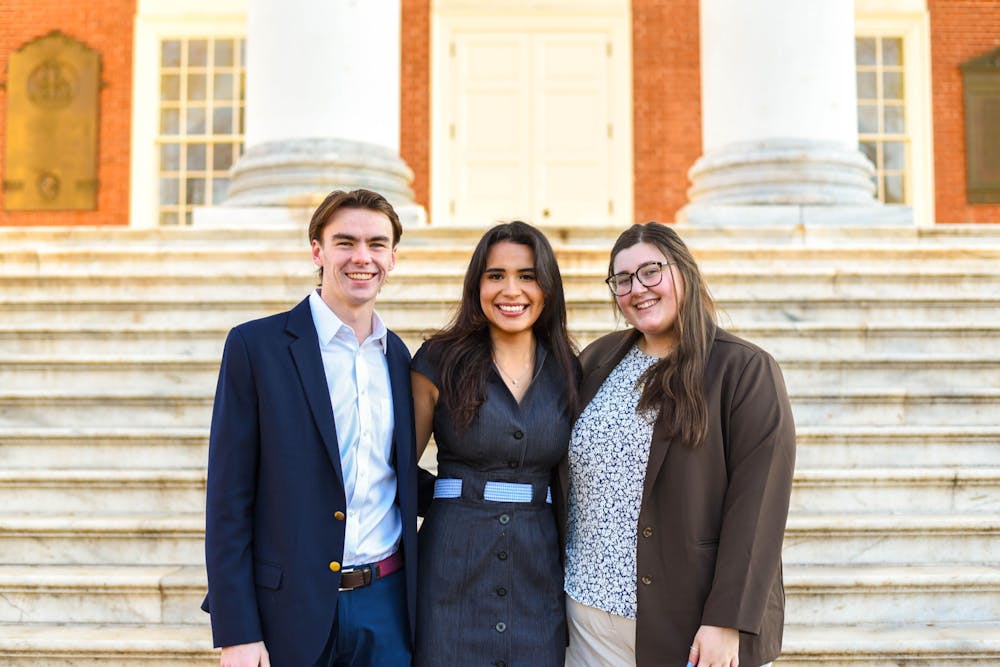This year, The Cavalier Daily Editorial Board endorses third-year College student Brookelyn Mitchell for Student Council Vice President of Administration, third-year College and Commerce student Ryan Bowers for Student Council Vice President of Organizations and third-year College student Valentina Mendoza Gonzalez for Student Council President. Running together under The Voice Movement, their ticket is framed around the values of community, transparency and justice. While we have questions about the role Mendoza Gonzalez will play in a potential Voice Movement administration, the Editorial Board was exceptionally impressed by both Mitchell and Bowers and is confident in their ability to actualize tangible initiatives and bargain effectively with University administration to advance student interests. The Editorial Board believes that, collectively, this ticket will be able to uphold the mission of Student Council and appropriately represent the views of the student body.
The Student Council receives its mandate from the Board of Visitors and relies upon approval from University administration to implement its resolutions. Because of this dynamic, the Student Council website declares that it is bargaining instead of governing. Both Mitchell and Bowers intimately understand this dynamic and have a tangible plan to navigate it. Mitchell explained that the Vice President of Administration must be persistent in their interactions with administration — an initial refusal is not absolute but is rather an imperative to find a creative workaround that is acceptable to everyone. In addition to demonstrating a commitment to creative bargaining, she articulated a tangible way to bring student voices into the conversation — bringing relevant students directly to administration instead of serving as a simple vehicle for their voices.
On a similar note, Bowers explained that Student Council is a vehicle for Contracted Independent Organizations to voice their concerns to administration and for administration to voice their concerns to CIOs. Bowers correctly identified this nuance and explained that while administration may have the final call, Student Council must continue to work hard to frame Student Council decisions as an embodiment of student self-governance. It is this impressive and nuanced conception of Student Council’s bargaining power that makes the Editorial Board confident that Mitchell and Bowers will be able to actualize the tangible initiatives they laid out.
Crucially, The Voice Movement proposed multiple tangible initiatives that will better support the student body. Mitchell proposed using the resources of the Administration Branch to investigate whether or not the University upholds its claim to meet 100 percent of demonstrated need. While this is an ambitious undertaking, she also articulated smaller scale changes that will be hugely impactful for the student body. For example, she emphasized the importance of inter-CIO collaboration which, in her view, can be uniquely facilitated and publicized by a newly revamped Student Council marketing team. We applaud both her big-picture ambitions and her relentless focus on empowering and connecting CIOs to foster student engagement. Bowers, in the role of Vice President of Organizations, will oversee the apportionment of CIO funds and seeks to make this process both more transparent and stream-lined. In this vein, he proposed revamping the CIO consultants whom he hopes will become a group that is not only responsible for the activities fairs but also for advising CIOs on how to properly request funding. While seemingly minute, this is a wonderfully innovative approach to improving the equitability of fund apportionment and the overall transparency of the Organizations Branch.
In addition to tangible initiatives, both Mitchell and Bowers underlined the radical potential of the new endowment, specifically in the realm of increased funding for the Support and Access Services and for CIOs. The former would benefit from targeted increased funding to improve the vital resources it offers to students such as the free store and Airbus. CIOs, similarly, would be better positioned to engage and support students with the extra resources. But perhaps more important than the potential of the endowment, was their understanding that it must be carefully managed with an eye for long-term sustainability.
While University President Jim Ryan’s office will provide the initial $750,000 of the endowment over three years, the rest must be raised in order to enshrine the benefits that this endowment connotes for future councils. Mitchell emphasized that achieving more funding is reliant, in part, on proving student need. Building upon this, Bowers explained that not only must Student Council demonstrate student need for the endowment, they must also provide material proof to potential donors that the endowment funding is having a tangible impact. Given the immense potential of the endowment to promote Student Council autonomy, the Editorial Board applauds this creative, yet balanced approach.
In short, the Editorial Board is confident that Mitchell and Bowers are more than capable of representing the best of the student body as they work to transform their ideas into concrete realities. In contrast, Mendoza Gonzalez, in her interview with the Editorial Board, neither articulated clear or feasible strategies for dealing with administration — one of her primary responsibilities — nor posited concrete solutions that address genuine problems. For this reason, the Editorial Board is unsure what Mendoza Gonzalez’s role will be in this prospective administration. To her credit, however, she has running mates who are extraordinarily well-qualified for their respective posts — so much so that the Editorial Board has no qualms about endorsing The Voice Movement. We remain hopeful that Mendoza Gonazalez’s vision for Student Council will become more thoroughly apparent if she is elected. For now, though, we are ambivalent about what Mendoza Gonzalez brings to The Voice Movement yet confident about the potential of The Voice Movement as a collective.
The Cavalier Daily Editorial Board is composed of the Executive Editor, the Editor-in-Chief, the two Opinion Editors, their Senior Associates and an Opinion Columnist. The board can be reached at eb@cavalierdaily.com.







